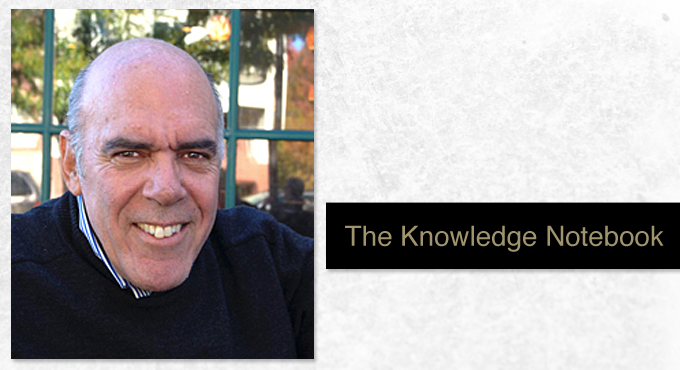By Laurence Prusak
A while ago I asked a number of colleagues, clients, and friends the following question: “If the word ‘knowledge’ were somehow banned from the English language, what existing word could take its place?”  The answer I get most often, especially when I’ve asked students and others who are not in the business of thinking about organizational knowledge, is “information.” It’s a natural and reasonable enough choice, I suppose, but the answer I would give and the one I want to advocate is “meaning.” When I explain why I prefer that word, I usually can get most practitioners of knowledge-related work to agree. After all, meaning is what gives information its value. The meaning-making process takes the codified symbols that we call information and makes sense of them in ways that help guide our thoughts and actions.
The answer I get most often, especially when I’ve asked students and others who are not in the business of thinking about organizational knowledge, is “information.” It’s a natural and reasonable enough choice, I suppose, but the answer I would give and the one I want to advocate is “meaning.” When I explain why I prefer that word, I usually can get most practitioners of knowledge-related work to agree. After all, meaning is what gives information its value. The meaning-making process takes the codified symbols that we call information and makes sense of them in ways that help guide our thoughts and actions.
Meaning is subjective, of course. We develop our own mechanisms for giving meaning to things and words from the world around us and the world within us. Different people interpret the same information in different ways and sometimes discover in it (some might say, impose on it) very different meanings.
Yet we live in a world of collective activities. Teams, projects, organizations, schools—all have to develop collective meaning in order to do their collective work. This happens, of course. If it didn’t, collaboration would be impossible. We assign common meanings not just to words but to all sorts of representations and symbols, and this collective sense-making allows organizations and cultures to flourish. Yet it happens in subtle and often unnoticed ways—pervasive yet invisible—and our failures to pay conscious attention to the process of shared meaning-making means that we often don’t work together as effectively as we could.
The process, however, is often overlooked and even disdained by the latest incarnations of technoutopians who continue to argue that information alone matters and that the more of the stuff we have, the better an outcome will be. I was told three times in the past month—by people in a federal agency, a prominent non-governmental organization, and a commercial firm—that more connectivity in any system (in other words, greater access to information) means that the proposed system will develop more knowledge. When I pointed out that this isn’t at all a proven case, I quickly lost my audience. They wanted to move on to system configuration, not talk about whether the system would actually provide the promised value. I’m used to this kind of response, so I wasn’t especially upset personally, but past experience suggests that their expectations are likely to be unmet.
… our failures to pay conscious attention to the process of shared meaning-making means that we often don’t work together as effectively as we could.
Let’s look briefly at a few of the things meaning can bring to information. I am inspired to do this by recently reading a wonderful new book on the history of information by James Gleick called The Information: A History, a Theory, a Flood, and by doing some teaching in Tokyo for Fuji and some of their clients on the subject of practical wisdom, which is closely related to what I am writing about here.
Context. Meaning puts information in context, showing where it belongs in the scheme of things, how it relates to other information, how it adds to or modifies existing knowledge.
Implications and Consequences. Meaning gets at the implications of information, its potential effects on individuals, organizations, and society.
Thinking in Time (also the title of a wonderful book). Meaning-making includes thinking about where information originated and where it seems to be going, and how its origins affect how we interpret it.
You get the picture, I hope.
Let me be just a bit more personal here. I was once a contestant on a national quiz show. I had a very good memory at the time and liked to read, so I was a natural for this type of thing. I did well and for a time thought I was much smarter than I actually was. I could recite facts that I didn’t know the meaning of and confused this skill with having real knowledge, judgment, and discernment. This was a long time ago—I was a college student—so I won’t be too hard on myself. Because of my quiz-show experience, I was quite interested in the reactions to Watson, the elegant IBM computer program that recently beat a couple of Jeopardy champions. But when pundits declare that the machine is “smarter” than people, I am reminded of my own experience of the silliness and shallowness of this type of thing.
Gleick ends his fine book by talking about how, among the seemingly infinite amount of information we now have at our fingertips, we still are always “looking for lines of meaning.”
Think about it.
Write to the Author
- Contact Laurence Prusak
More Articles by Laurence Prusak
- The Knowledge Notebook-What’s Right About Being Wrong (ASK 40)
- The Knowledge Notebook-Believing in Science and Progress (ASK 39)
- The Knowledge Notebook-On Not Going It Alone: No Organization Is an Island (ASK 38)
- The Knowledge Notebook-How Organizations Learn Anything (ASK 37)
- The Knowledge Notebook-Slow Learning (ASK 36)
- + View More Articles









